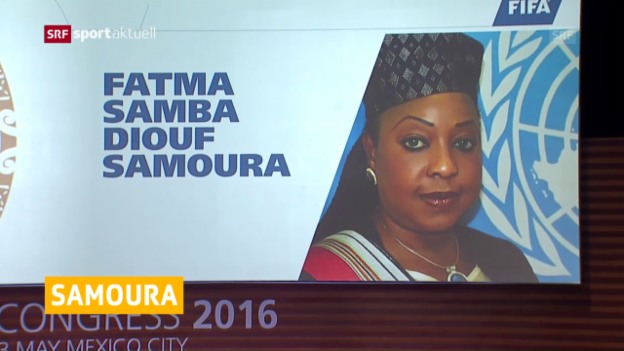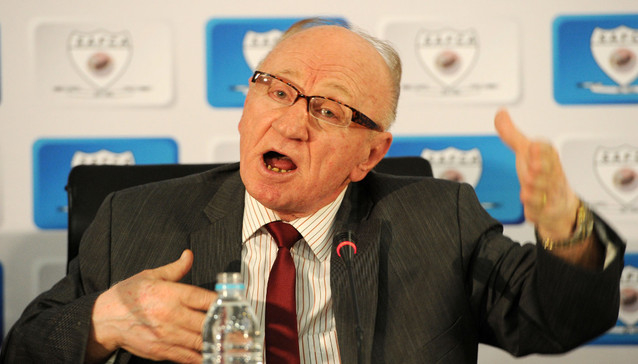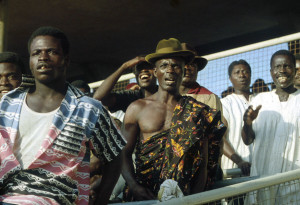Guðmundur Benediktsson who?
On Wednesday, June 22, the 41-year-old Icelandic announcer’s emotional call of Iceland’s winning goal against Austria at Euro 2016 went viral. The moment was immediately enshrined into the unofficial Hall of Fame of soccer broadcasting.
Benediktsson is no ordinary broadcaster. He played for Iceland from 1994 to 2001 and has coached steadily since the end of his playing career in 2009, most recently as an assistant at KR Reykjavík — the tiny island nation’s most celebrated club. The family love of the game extends to Benediktsson’s 19-year-old son, Albert Guðmundsson, who is on the books of PSV Eindhoven, and whose mother is a former Iceland international.
Iceland and Austria were in stoppage time, with the score tied 1-1. Austria, needing to win to advance to the second round, was launching its final desperate attacks. Iceland was deep in its defensive bunker, knowing a point would be enough to earn an historic qualification to the knockout phase.
With 45 seconds left, the Icelandic defense brutishly clears a ball, which randomly finds Bjarnason all alone charging full speed ahead towards the Austrian goal. In the blink of an eye, a three-on-one breakaway develops.
Benediktsson does more than announce the Iceland players’ excited forward movement. He seems to thrust them towards the Austrian goal.
There will be no running out the clock by the corner flag. No way. Iceland are beyond the point of no return.
Bjarnason slices a deliciously inviting assist across the penalty box. Traustason, a substitute, slides in at the far post and strikes the ball with his left foot.
Benediktsson’s first eruption literally encourages the ball into the net, past the outstretched hands of the diving Austrian goalkeeper: “Jaaaa!”
“Jaaaa! Jaaaa! Jaaaa! Jaaaa!” Benediktsson loses it. His primal scream is like “a ‘do’ sung [in Icelandic] from the chest that would leave Caruso forever mute,” in the words of Eduardo Galeano.
It’s more than orgasmic. “Maybe if I hadn’t made love for eighteen years, and had given up hope of doing so for another eighteen, and then suddenly, out of the blue, an opportunity presented itself,” Nick Hornby reminds us in Fever Pitch, “maybe in these circumstances it would be possible to recreate an approximation of that [. . .] moment.”
The Polish referee, Szymon Marciniak, blows the whistle. It’s over! Iceland 2, Austria 1. Iceland is through to the last 16.
Benediktsson, exhausted, goes quiet.
Should Iceland pulls off a miraculous victory against England on Monday (June 27), Benediktsson’s performance may surpass the one that made him world famous.

Fatma Samba Diop Samoura of Senegal, a career United Nations diplomat, was recently appointed by FIFA President Gianni Infantino as the world body’s new secretary general. “She will bring a fresh wind to FIFA—someone from outside,” Infantino declared.
Listen to my radio interview with Assumpta Oturu as we discuss the significance of Samoura’s appointment and its possible implications for substantive reforms at scandal-ridden FIFA.
The interview originally aired on KPFK’s “Spotlight Africa” program on June 3, 2016.

Ted Dumitru, the Romanian-born coach who had a successful career in South Africa, collapsed and died of an apparent heart attack on Thursday at Eastgate Shopping Centre in Johannesburg.
“Throughout our conversations over the years,” recalls Zola Doda in a touching tribute published on Kick Off magazine’s website, “Ted didn’t talk a lot about his country of birth, Romania, which came across as strange to me in the beginning. All he spoke about was South Africa and the African continent as a whole—but over a period time I learned to understand how much he really loved this country and this continent.”
Having coached briefly in the U.S., where he acquired citizenship, Dumitru took the helm of Zambia’s national team in 1981 and later that of Swaziland. He arrived in apartheid South Africa to coach Kaizer Chiefs in 1986, a time of mass protests and army troops deployed in the black townships. Dumitru went on to win four league titles, with Sundowns (1997-98 and 1998-99) and Chiefs (2003-04 and 2004-05), and also had a brief stint as national team coach.
Beyond his clubs’ successes, Dumitru had a major impact on South African coaching education and on youth development. I saw this personally and tracked it over two decades in South Africa and from overseas.
I first met Ted Dumitru in 1995. A friend I had met on the soccer pitch at Wits University took me to the South African Football Association’s first coaching certification course held at the School of Excellence. I was introduced to Dumitru, then the Director of Coaching at SAFA, who was dressed in his typical sweatsuit-and-baseball cap attire. As soon as he learned of my work on the history of football in South Africa, he asked me to return the following morning and give a formal presentation to the coaches. Dumitru believed a country needed to know its football history in order to develop its national identity.
The next day I faced an engaged audience that included Patrick Pule “Ace” Ntsoelengoe, Cedric “Sugar Ray” Xulu, Neil Tovey and many other legendary figures in the South African game. If that context wasn’t intimidating enough, I was also scheduled to follow the charismatic Clive Barker, then-national team coach who, a few months later, would lead Bafana Bafana to their first (and still only) African Nations Cup title.
Dumitru introduced me in a graciously professional and courteous way, which made me feel less intimidated by the moment and helped set the tone for what turned out to be a constructive session and dialogue among the participants.
During that visit, I learned of Dumitru’s background in Romania in the late 1960s and 1970s. I listened to him discuss the emergence of “scientific football” as popularized by Valeriy Lobanowski, the legendary coach of Dynamo Kiev and the USSR. At the time, it was a pioneering approach. It brought together empirical data, computer technology, Soviet collectivist ideology, and Dutch total football. It transformed the way Dumitru conceived, organized, and managed football teams. As Jonathan Wilson succinctly puts it, “football was less about individuals than about coalitions and the connections between them.”
To his credit, Dumitru’s experiences in southern Africa altered his football philosophy and practice to reflect local conditions. Dumitru passionately believed in the technical proficiency, dynamism, and creativity of local players. He spent much of the latter part of his career teaching both young boys and adult coaches how to draw on these strengths while combining them with aspects of scientific football. In the words of Mark Gleeson, Dumitru became “an outspoken proponent of the establishment of a so-called ‘ South African style of play’ with heavy emphasis on individual flair.”
This emphasis was clearly demonstrated before my eyes again in 2010—a magical year for South Africa as it successfully hosted the first World Cup played on African soil. Dumitru came to Pietermaritzburg to help train local coaches and in the process supervised a training session at the Izichwe Youth Football program, where I was involved. His principles were put into action, as he encouraged each and every player to think about space, quick decision-making, smart passing, confidence in dribbling, relationship with teammates, and to be unafraid of expressing joy on the pitch. When one boy scored a mesmerizing goal but did not celebrate, Dumitru encouraged him to do so: “Soccer is supposed to be fun!” he exclaimed.
Dumitru, of course, had his shortcomings. According to Gleeson, he was perceived by many as “dogmatic” and few can forget his public statement that South Africa’s first-round exit from the 2006 African Nations Cup was partly due to the fact that “my players don’t know how to play in the rain.”
Even so, Dumitru should be remembered as an innovative coach who left an important legacy in South Africa. He introduced new ideas from eastern Europe at a time when the country was isolated from international football and when South African coaching was dominated by English-speaking whites. Dumitru stands out as a rare white coach who genuinely believed in decolonizing South African football. To the end, he practiced what he preached. At the time of his passing, Dumitru was in town to give a speech at the South African Football Coaches’ Association Youth Coaching Seminar at Johannesburg Stadium.
Africa’s Premier League
Africa is a Country‘s film division is working on an intriguing fútbol project that I just supported on Kickstarter.
What’s it about? Africa’s Premier League is a film that follows four fans—in Nigeria, Kenya, South Africa and DR Congo—as they live through the highs and lows of a football season as a way to explore popular enthusiasm for “English football” in Africa. The project will also include a web series and a TV series.
“We want to show, in depth and detail, exactly how English football fits into the ordinary lives of African supporters,” say the producers. “Our film will tell the story of Africa’s passion for the English Premier League, through the eyes of the fans themselves.”
Act quickly to help with post-production! Click here to make your Kickstarter donation.
 Image: Eliot Elisofon Photographic Archives, National Museum of African Art, Washington, D.C.
Image: Eliot Elisofon Photographic Archives, National Museum of African Art, Washington, D.C.
Cross-posted from The Allrounder
[First published on November 13, 2014]
We don’t just watch sports – we speak and hear sports. To find out how language shapes our lives as fans, we asked some of our writers to tell us about the ways that people talk sports in English and their native languages. Kay Schiller hails from Munich, fellow historian Peter Alegi grew up in Rome, media scholar Markus Stauff lives in the Netherlands, and sociologist Pablo Alabarces teaches at the University of Buenos Aires. Together, they offer a Rosetta Stone of sports talk.
You’ve all lived for a time in English-speaking countries. Did anything in particular strike you – say, the first times you went to a stadium or watched a match on television – about the ways that native speakers of English talk about their sports?
Kay Schiller: I have lived in the UK since 1997. One of the things that struck me as a non-native speaker when going to see Chelsea, Spurs, Liverpool, ManU, or, more recently, Blackburn Rovers was that I had a tremendously hard time understanding the terrace chants, despite being quite fluent in English. I suppose that this is similar to what English fans experience when they attend a Bundesliga match.
Thankfully, there are now websites that explain what you hear in the stadium. You can learn that Blackburn Rovers fans at Ewood Park have several profane chants for Burnley, such as “Burnley are s**t s**t s**t , they always gonna be s**t.” One major difference with Germany is that while this kind of folklore can be found in the supporters’ curves of stadia, you wouldn’t hear otherwise respectable-looking people participating in chants like these – or middle-aged ladies calling the referee a c***.
I’m not sure what this suggests about the different football cultures of England and Germany, or culture more generally, but I find it worthy of note. Perhaps it’s reassuring that even with all-seater stadia and the continuous jacking-up of gate prices in English football, some things do not change.
Peter Alegi: At venerable Fenway Park in Boston, sitting in the bleachers with my dad (obstinately wearing a Yankees cap), the usual chant we heard was: “Yankees suck!” At New Haven Coliseum, where my older brother and I followed minor league ice hockey, it was: “Shoot the puck!” At basketball and American football games, giant electronic scoreboards demanded chants of “Deeeeee-fe-nse!”
This was a world away from the Italian football stadiums and basketball arenas I grew up with.
What first struck me in the U.S. was a lack of spontaneity in the language of fans at the grounds. The PA announcer, the scoreboard, and recorded music directed the orality of the crowd. Maybe this was because of the corporate nature of American sports, with its top-down manufactured stadium experience that transforms fans into consumers. It’s also hard to chant and sing when spending so much time, money, and energy eating and drinking during games. In any case, the second thing that hit me about the U.S. context was the lack of creativity in the language. Much of the spoken word among fans, chants and commentary alike, seemed very direct and not terribly imaginative, a bit like the English language!
In Italy, our oral culture at the stadium was far more creative. I remember sitting in the stands listening to self-appointed bards who would rise to recite absorbing monologues in the vernacular (dialects are hugely important and richly diverse in Italy). These men (rarely were they women) explained the causes of our striker’s inexplicable impotence or the reasons for the referee’s situational ethics. The language was often metaphorical, indirect. The best insults were the ones delivered with a perfect balance of grit, humor, and linguistic dexterity. Even my intellectual Roman mother, with a PhD in Italian literature, relished such vulgar poetic performances (“vulgus” in Latin means ordinary people, after all). This creative genius came through in the songs we sang. Fans developed an art of crafting lyrics and combining them with a dizzying range of musical sources: classical (Beethoven’s “Ode To Joy” was a favorite); operatic (Verdi, of course); patriotic compositions (“La Marseillaise”); marches (John Philip Sousa!); folk/traditional (“La Società dei Magnaccioni,” “O Sole Mio,” and “Auld Lang Syne”); partisan resistance (“Bella Ciao”), and loads of pop (from “Yellow Submarine” to Antonello Venditti’s “Roma, Roma, Roma”).
Eventually, I came to appreciate the comfort and safety of U.S. stadiums and arenas. But to this day, their canned and often lifeless aural culture makes me nostalgic of home.
Click here to read on.
Johan Cruyff, Football Genius, Dies at 68
Johan Cruyff, the Dutch football genius, has died of cancer at the age of 68.
When I was 7 or 8 years old, growing up in Rome, Italy, my older brother Danny took me along with some of his friends to watch “Il Profeta del Gol.” Sitting in the front row of a run-down movie theater with funky aromas, I was hypnotized by this mesmerizing documentary film about Cruyff. It was narrated by the legendary radio announcer Sandro Ciotti, whose raspy voice (along with the more suave one of Enrico Ameri) provided the soundtrack of our Sunday afternoons on “Tutto il calcio minuto per minuto”—the only live media coverage of Serie A available at the time. For years, I dreamed with eyes wide open of Cruyff’s “Impossible Goal” against Atletico Madrid.
Watching Cruyff took my typically Italian compulsive love for football to a precociously mature level. By the time Michel Platini (my hero) and Diego Maradona joined Juventus in ‘82 and Napoli in ‘84, respectively, I was ready for their magic. But when I had to move to the United States later in the 1980s, it was in deference to the Dutchman that I wore his number 14 on my high school, club, and college teams.
Cruyff seemed both extraordinary and ordinary. His visionary use of space, technical excellence, and quickness were inseparable from his scrawny physique, tempestuous nature, cigarette smoking, and dislike of fitness training.
Cruyff’s interpretation of football as a competitive art taught me to see alternative ways to play, move, think, and even “be.” Ajax’s “Total Football,” which Cruyff exported to Barcelona, first as a player then as a coach, was so radically different from the way Serie A teams played in the 1970s and early 1980s. “Everyone attacked and everyone defended,” Eduardo Galeano remembered, “deploying and retreating in a vertiginous fan.”
His stunning decision to boycott the Generals’ World Cup in Argentina in 1978, the first I followed religiously on television, endeared the Dutchman to me even more. An anti-fascist superstar who practiced what he preached! (The actual reason, I would later learn, had nothing to do with politics: he feared being kidnapped.)
Frits Barend, the Dutch TV commentator and personality, whom I met in South Africa in 1998, referred to Cruyff as an “obstinate maestro.” David Winner, author of Brilliant Orange, arguably the best book written in English about Dutch football and society, described him as “essentially Dutch.”
A poem by Toon Hermans, Winner writes, “captures the feeling that there was something sublime about Cruyff”:
En Vincent zag het koren
En Einstein het getal
En Zeppelin de Zeppelin
En Johan zag de bal
(And Vincent saw the corn
And Einstein the number
And Zeppelin the Zeppelin
And Johan saw the ball)
